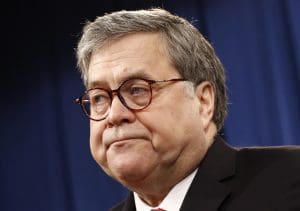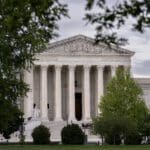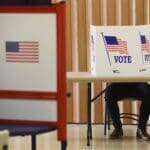Barr lied: Mueller found that Trump tried to obstruct justice — a lot
Attorney General William Barr said there wasn’t enough evidence to conclude Trump obstructed justice. But special counsel Robert Mueller’s report says otherwise.

Attorney General William Barr held a shameful “news” conference Thursday morning, in which he attempted to convince the public there was not enough evidence in special counsel Robert Mueller’s report to charge Trump with obstruction of justice — all before the report was even released.
However, his gambit failed miserably, as Mueller’s report lays out ample evidence that Trump not only obstructed justice but had motive to do so — and was only stopped by some staffers who refused to carry out his unlawful orders.
Here’s what Barr said about his reasoning not to charge Trump:
After carefully reviewing the facts and legal theories outlined in the report, and in consultation with the Office of Legal Counsel and other Department lawyers, the Deputy Attorney General and I concluded that the evidence developed by the Special Counsel is not sufficient to establish that the President committed an obstruction-of-justice offense.
Barr went on to say,
As the Special Counsel’s report acknowledges, there is substantial evidence to show that the President was frustrated and angered by a sincere belief that the investigation was undermining his presidency, propelled by his political opponents, and fueled by illegal leaks. Nonetheless, the White House fully cooperated with the Special Counsel’s investigation, providing unfettered access to campaign and White House documents, directing senior aides to testify freely, and asserting no privilege claims. And at the same time, the President took no act that in fact deprived the Special Counsel of the documents and witnesses necessary to complete his investigation.
Mueller’s report, however, says the exact opposite of what Barr claimed.
First, Mueller’s report says that if his team “had confidence after a thorough investigation of the facts that the President clearly did not commit obstruction of justice, we would so state.”
However, “Based on the facts and the applicable legal standards, we are unable to reach that judgment. Accordingly, while this report does not conclude that the President committed a crime, it also does not exonerate him.”
And, unlike what Barr claimed, Mueller’s team says that the Trump campaign and especially Trump himself were not fully cooperative.
Mueller’s report accuses key members of the Trump campaign of both deleting evidence as well as using encryption services that don’t retain messages so that some evidence was lost forever.
Some of the individuals we interviewed or whose conduct we investigated — including some associated with the Trump Campaign — deleted relevant communications or communicated during the relevant period using applications that feature encryption or that do not provide for long-term retention of data or communications records. In such cases, the Office was not able to corroborate witness statements through comparison to contemporaneous communications or fully question witnesses about statements that appeared inconsistent with other known facts.
Then, Mueller says Trump’s written responses to Mueller’s questions were “inadequate” but that investigators decided against waging a protracted legal battle to subpoena Trump to testify.
Recognizing that the President would not be interviewed voluntarily, we considered whether to issue a subpoena for his testimony. We viewed the written answers to be inadequate. But at that point, our investigation had made significant progress and had produced substantial evidence for our report.
Barr also stated that Trump didn’t have corrupt intent to obstruct Mueller’s probe.
Apart from whether the acts were obstructive, this evidence of non-corrupt motives weighs heavily against any allegation that the President had a corrupt intent to obstruct the investigation.
However, Mueller’s report overtly states that “the President had a motive to put the FBI’s Russia investigation behind him” — a.k.a. obstruct justice.
The evidence does indicate that a thorough FBI investigation would uncover facts about the campaign and the President personally that the President could have understood to be crimes or that would give rise to personal and political concerns. Although the President publicly stated during and after the election that he had no connection to Russia, the Trump Organization, through Michael Cohen, was pursuing the proposed Trump Tower Moscow project through June 2016 and candidate Trump was repeatedly briefed on the progress of those efforts.
Ultimately, Mueller points out multiple instances of Trump trying to obstruct justice, including by encouraging then-FBI Director James Comey to end the investigation of former aide Michael Flynn and ordering the firing of Mueller himself.
However, Muller writes that Trump’s obstruction efforts failed “largely because the persons who surrounded the President declined to carry out orders or accede to his requests.”
Comey did not end the investigation of Flynn, which ultimately resulted in Flynn’s prosecution and conviction for lying to the FBI. [White House Counsel Don] McGahn did not tell the Acting Attorney General that the Special Counsel must be removed, but was instead prepared to resign over the President’s order. [Corey] Lewandowski and [Rick] Dearborn did not deliver the President’s message to [Attorney General Jeff] Sessions that he should confine the Russia investigation to future election meddling only. And McGahn refused to recede from his recollections about events surrounding the President’s direction to have the Special Counsel removed, despite the President’s multiple demands that he do so.
As much as Barr tried to whitewash the Mueller report, Mueller’s team found multiple instances of obstruction of justice.
However, Mueller’s team believed the job of charging a president lies with Congress.
“We concluded that Congress can validly regulate the President’s exercise of official duties to prohibit actions motivated by a corrupt intent to obstruct justice,” the Mueller report states.
It’s in Congress’ hands now.
Lisa Needham also contributed to this report.
Published with permission of The American Independent.
Recommended

Rosenblum, other Democratic AGs ask SCOTUS to block red state bans on emergency abortions
Oregon Attorney General Ellen Rosenblum and nearly two dozen other Democratic-led states urged the U.S. Supreme Court to preserve the ability of emergency room doctors to provide abortions, arguing that failing to do so would have devastating effects for their health care systems and women across the country.
By Gloria Rebecca Gomez, Arizona Mirror - April 01, 2024
Ken Paxton paid $2.3 million to defense lawyers for impeachment trial
The lawyers were paid from his campaign, according to a report filed this week.
By Patrick Svitek, The Texas Tribune - January 18, 2024
Texas governor and attorney general do little to curb state’s chemical plant crisis
Republicans Greg Abbott and Ken Paxton have taken thousands of dollars in donations from chemical companies and their affiliated PACs.
By Jesse Valentine - December 08, 2023








































































